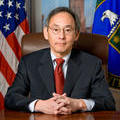With Congress about to confirm Ernie Moniz as the nation’s new energy secretary, it’s a good time to take a look back on what his predecessor, Steven Chu, accomplished with new appliance, equipment and lighting efficiency standards. In brief, he accomplished a lot. But not as much as he might have if he’d had better backing from the White House. Let’s start with the hard numbers. Taking into account products sold between now and 2035, new efficiency standards adopted during Chu’s four-year stint will net U.S. consumers and businesses more than $100 billion in savings. The energy saved by these new standards will be about enough to power the entire U.S. economy—all of our buildings, industries, homes, cars, and trucks—for about four months.
Chu had a fertile field with which to work. Congress, recognizing the enormous energy-saving benefits from existin g efficiency standards, charged DOE with developing many new standards as part of energy laws enacted in 2005 and 2007. In addition, Secretary Chu’s immediate predecessor at the Department of Energy (DOE), Sam Bodman, prompted by litigation and Congressional oversight, committed the agency to catch up on 22 missed deadlines for updates to existing standards, some stretching back to the mid-1990s.
g efficiency standards, charged DOE with developing many new standards as part of energy laws enacted in 2005 and 2007. In addition, Secretary Chu’s immediate predecessor at the Department of Energy (DOE), Sam Bodman, prompted by litigation and Congressional oversight, committed the agency to catch up on 22 missed deadlines for updates to existing standards, some stretching back to the mid-1990s.
Empowered by President Obama, who issued an executive order just days after taking office directing DOE to meet and beat all its legal deadlines for new standards, Chu seized the opportunity. Here are some of the highlights:
- Standards completed in 2009 for the tube-shape fluorescent lamps used mostly in offices will save more energy than any other standard ever issued by DOE.
- New water heater standards will help heat pump technology and gas condensing technology gain a market foothold by focusing on large water heaters where these new technologies are most cost-effective.
- New residential refrigerator and clothes washer standards will reduce the average energy use of these products by about 25% and 40%, respectively. These standards show that continued technological gains can deliver cost-effective energy savings, even for products that have already achieved dramatic improvements.
Chu succeeded in part by changing the culture at DOE: he made saving energy exciting and he extolled the power of standards to drive the biggest results. Just months into office, he told National Geographic that “Appliance standards, ka-BOOM, can be had right away.” Chu backed up his words with new staff and resources.
By 2012, DOE had caught up on all of the overdue standards accumulated under prior administrations. Just as importantly, Chu had launched new work to consider whether standards could help drive cost-effective efficiency improvements for additional product categories such as industrial products (e.g., pumps, fans, and compressors) and consumer electronics like set-top boxes. A committed academic (Nobel laureate in physics, to be precise), the Secretary even pitched in as an analyst, helping the agency improve how it estimates the impact of appliance standards on product prices. Under Steven Chu, the DOE’s appliance standards office became a place to make energy savings happen.
Unfortunately, Chu’s momentum was slowed and, eventually, all-but-halted by the White House’s regulatory apparatus. Every major new rule must be reviewed by the White House’s Office of Information and Regulatory Affairs (OIRA) prior to agency publication. OIRA at first completed its’ reviews expeditiously. But, starting in 2010, the review process, which is supposed to take 60 to 90 days at most, started to stretch out. No rules were immune—even the new home appliance standards backed by manufacturers, consumer groups, and efficiency advocates together were stalled for months. Eventually, those standards were completed, but some effective dates were delayed, which means millions of needlessly inefficient appliances will be sold and remain in use, wasting energy for years.
As of this writing, seven new standards covering a range of products from microwave ovens to industrial motors are overdue. (DOE published new standards for distribution transformers last month, the first new standard in nearly a year.) The overdue standards are not especially controversial—for example, manufacturers and efficiency advocates have submitted a consensus proposal for new motor standards and the microwave oven standard would simply cut down on standby mode electricity waste. But, as I described in a blog post in January, these delays are costing U.S. consumers. We are keeping a counter on the ASAP website to track the cost of the delays— the new backlog already has cost U.S. consumers and businesses $4.2 billion in lost savings and the costs are mounting. [Note: Since this blog post was published, the Obama administration has eliminated the backlog of delayed standards, issuing new standards for the products referenced in this post. May 2014]
As Georgetown Law Professor Lisa Heinzerling pointed out in a recent blog article, the reasons for the delays are puzzling, but what’s clear is that OIRA serves as “a portal into the political machinery of the larger White House.”
In sum, Secretary Chu saved more energy with new appliance standards than any of his predecessors, by a lot. But, with a little more backing from the White House, he could have done even more. If Chu can be faulted at all, perhaps he could have been more effective at shepherding rules through political channels of the White House. Regardless, because of his actions consumers and business will be saving billions of dollars in the years ahead.
Chu’s successor, Moniz, is also a physicist, but he comes with another credential: service in the Clinton Administration both in the White House and as the Under Secretary at DOE. This experience may serve him well as he navigates new standards to their completion. If Moniz achieves as much as Steven Chu, President Obama will rank as the president who did more than any other to cut the energy wasted in our homes, businesses, and industries. Let’s hope Moniz gets the White House backing he needs.


